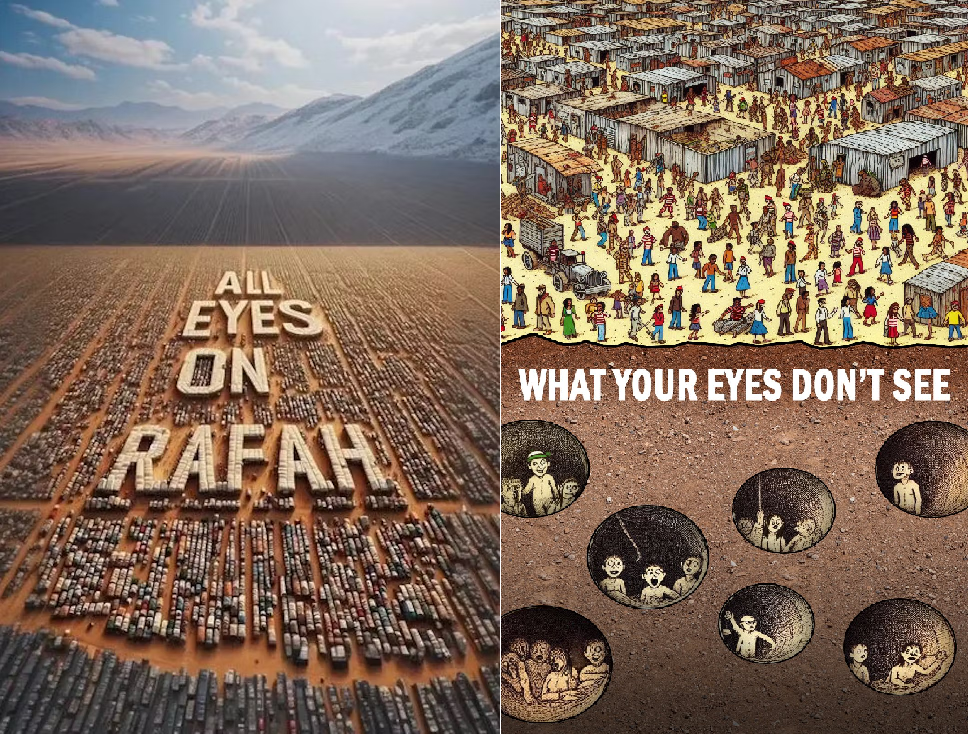
- Samuel Huntington’s “Clash of Civilisations” theory and John Mearsheimer’s “Offensive Realism” explain Israel’s actions as defensive measures rooted in broader cultural and security dynamics.
- The “All Eyes on Rafah” campaign showcases social media’s influence but has been criticized for ignoring similar outrage over Hamas’s October 7 attacks that egregiously violated the human rights of common Israelis.
- Foucault’s notion of “fearless speech” (parrhesia) emphasises the moral obligation to uphold the rights of both Israelis and Palestinians.
The Israel-Hamas conflict has reached new heights, with Rafah, a southern city in Gaza, becoming the focal point of intense military actions and global scrutiny. Following an Israeli bombardment that unfortunately resulted in the deaths of over 40 Palestinian civilians and the injuries of 200 more, the hashtag “All eyes on Rafah” went viral on social media on May 28. The attack, which was meant to target Hamas leaders Khaled Najjar and Yassin Rabia, accidentally caused an intense fire at a camp of refugees. This resulted in strong condemnation and the development of a widely shared AI-generated graphic that showed the extent of the damage.
Israel’s Counter-Campaign and the Genesis of Ongoing Conflict with Hamas
Israel responded by launching a counter-campaign titled “What your eyes fail to see,” which highlighted the horrific circumstances in which Hamas was holding 125 Israeli hostages. Through this campaign, the Israel Foreign Ministry hopes to change the perception of the situation and highlight the humanitarian catastrophe that these hostages, including women, children, and senior citizens, are facing.
The genesis of the currently ongoing conflict can potentially be traced to Hamas’s unexpected attacks on Israel on October 7, 2023, which claimed over 1,200 lives, most of whom were civilians, and abducted 252 more. At least 134 hostages, including children, were still taken captive by Hamas as hostilities resumed in November, despite a brief ceasefire. The Israeli Defence Forces (IDF) claimed a barrage of rockets launched from Rafah shortly before the airstrike. Israel’s recent military actions, including the airstrike on Rafah, have been a reaction to continued rocket strikes from Hamas.
Israeli Prime Minister Benjamin Netanyahu has staunchly defended the ongoing operations, emphasising the critical need to target Hamas leadership to safeguard national security. However, he expressed regret over civilian casualties, labelled the incident a “tragic mishap,” and committed to a comprehensive investigation to ensure accountability and prevent future occurrences.
In a decisive move, the International Court of Justice (ICJ) has ordered Israel to halt its operations in Rafah and withdraw from the area immediately. Despite the clear directive, Israel has yet to fully comply. This verdict was made merely one day after three European countries formally recognised Palestinian statehood, and it followed a wave of worldwide condemnation.
Theoretical Justifications for Israel’s Defensive Actions
In a comprehensive analysis of the Israeli conflict, political scientists and scholars provide robust frameworks that justify Israel’s actions as both defensive and essential for its survival. Samuel Huntington’s “Clash of Civilisations” theory and John Mearsheimer’s “Offensive Realism” explain Israel’s actions as defensive measures rooted in broader cultural and security dynamics. Concurrently, Alan Dershowitz’s “The Case for Israel” and Michael Walzer’s “Just War Theory” offer moral justifications, emphasising Israel’s right to self-defence and the ethical conduct of its military operations. Collectively, these theories underscore the view that Israel’s actions are vital for its territorial defence and national survival.
The Role of Social Media and Critique of Selective Activism
The viral “All Eyes on Rafah” campaign highlights the influential role of social media in shaping public opinion and international discourse. However, critics have pointed out the selective nature of this activism, questioning the absence of similar outrage over Hamas’s brutal October 7 attacks, which included the killing of soldiers and taking women hostage, actions that egregiously violated human rights. Notably, no comparable campaign emerged in support of Israel when Hamas crossed all bounds of humanity. This discrepancy raises critical questions about the International Court of Justice’s (ICJ) stance and actions during those times of severe aggression against Israel.
The International Court of Justice (ICJ) has ordered Israel to halt its operations in Rafah but the absence of similar outrage over Hamas's brutal October 7 attacks raises critical questions about the ICJ's stance and actions during those times of severe aggression against Israel.
Amidst ongoing conflict and relentless criticism, Israel’s stance and struggles are often overlooked. Has anyone truly attempted to understand the relentless challenges Israel faces? As the world’s only Jewish state, Israel has fought tirelessly to re-establish itself, transitioning from ghettos to a sovereign nation surrounded by hostile neighbours. Since its establishment, Israel has faced severe condemnation and has been in constant battle with terrorist groups like Hamas, Houthi, and Hezbollah. Despite these adversities, Israel has not only survived but has also actively sought to foster peaceful relations with neighbouring countries. The unique and profound difficulties Israel endures are often misunderstood or ignored by the international community, which continues to condemn Israel’s actions without fully grasping the relentless threats and existential challenges it faces daily.
In defending Israel’s security, it is imperative to recognise the serious humanitarian crisis that is unfolding in Gaza. According to UN estimates, over a million Palestinians have left the area due to the continuous fighting, and up to 1.4 million have taken refuge in Rafah. Foucault’s notion of “fearless speech” (parrhesia) emphasises the moral obligation to uphold the rights of both Israelis and Palestinians. This fair-minded strategy encourages a considerate conclusion, guaranteeing that the rights and security of each party concerned are given the top priority in the pursuit of peace.
(Anjali Singh is a Postgraduate student in political science and international relations. She has interned with the Indian Council of World Affairs, New Delhi, as a Research Intern. Views expressed are the author’s own)
Anjali Singh is a postgraduate student of Political Science and International Relations, a Social Media Analyst, and a former Research Intern at the Indian Council of World Affairs. Views expressed are the author’s own.
